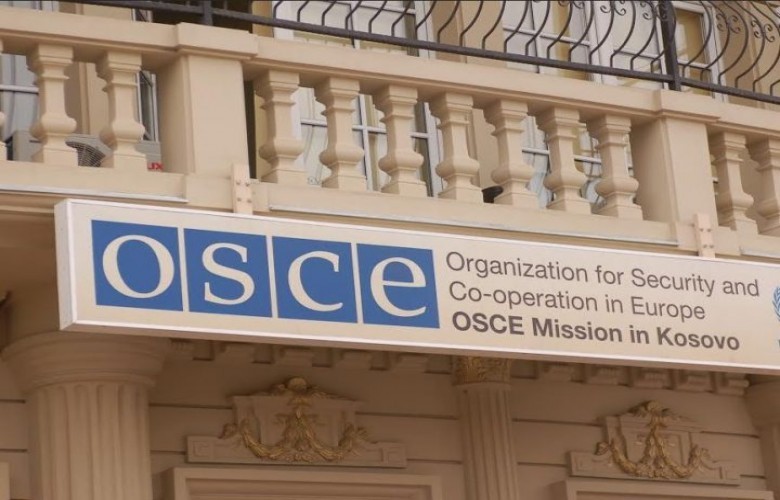The western Balkans are home to the biggest field operation of the Organization for Security and Co-operation in Europe (OSCE). But not everyone agrees the international body – this year chaired by Switzerland and largely preoccupied with Ukraine – is effective enough.
Take a handful of political analysts or journalists in Belgrade and Priština, mention the word OSCE. Chances are they will express considerable doubt about the use or the efficiency of the missions to Kosovo to bring more stability to the ethnically tense region in the Balkans.
Put this criticism to representatives of the 57-state member institution or of non-governmental organisations on the ground and – no surprise – the tune changes.
A recent fact-finding trip, organised by the Swiss foreign ministry, brought some answers and left more questions open.
It did not take long before someone, somewhere in the corridors of an office – or was it at a dinner table – brought up a couple of more or less flattering nicknames for the OSCE: Organization for Serving Coffee in Europe being among the more innocuous ones.
Besa Shahini, a senior analyst at the European Stability Initiative think tank is more categorical.
“I don’t know why the OSCE still needs 600 people in Kosovo. I disagree that we needed it for the [2013] elections in the North – another organisation could have helped just the same. We could have used the monitoring mission more for the election process.” She launches her attack during an informal roundtable discussion with young fellow experts.
She points out that aside from elections, the OSCE has largely limited itself to the role of a think tank in Kosovo, observing the implementation of various laws pertaining to minority issues in Kosovo and feeding its input into the political process.
The organisation does not win better marks from Leon Malazogu, co-founder of the Kosovo-based Democracy for Development think tank.
In an increasing passionate debate at the roundtable he describes the OSCE as “unhelpful” and “90% useless”.
“Apart from the elections in northern Kosovo, and some useful reports on the rule of law, the OSCE can hardly justify its massive presence.” (The mission in Kosovo is the OSCE’s biggest.)
Malazogu refers to last year’s ballot when the organisation was accused of siding with politicians, instead of supporting NGOs which uncovered cases of suspected irregularities.
Visibility
Scepticism persists also among local journalists and western correspondents.
Jeta Xharra, Kosovo director of the Balkan Investigative Reporting Network (BIRN), does not mince her words when she slams the OSCE mission as “impotent”.
The renowned journalist doubts whether the Swiss chairmanship this year will make much of difference to improve the situation.
For his part, Walter Müller, southeast Europe correspondent of the Swiss public radio, SRF, would not go that far, but he questions the efficiency and visibility of the OSCE efforts in the region.
“The presence of OSCE representatives particularly in the southern Serbian Preševo Valley has been very useful to prevent violence. Still I sometimes wonder what the organisation is up to with all its staff,” Müller quips.
Globally, the OSCE in 2013 employed nearly 2,900 staff in its 16 field missions and the headquarters in Vienna, and had a budget of €144.8 million (CHF176.6 million).
On the ground
The mandate of the world’s biggest security organisation – set up as a forum for dialogue between the West and the East during the Cold War era – is to promote human rights and provide expertise in the development of democratic societies, including the rule of law and good governance.
High on the agenda is the protection of national minorities in Kosovo and Serbia.
Among the projects supported by the Swiss OSCE Taskforce is a four-month course at a secondary school in the town of Bujanovac. The aim is to encourage the Albanian-speaking students to learn Serbian, as the lack of sufficient language skills often reinforces segregation in one of the poorest regions in southern Serbia.
The development of a multi-ethnic community police service in the same region is another much vaunted OSCE programme.
Mixed patrols of ethnic Serbs, Albanians and Roma has contributed to building up trust in state authorities, according to local police officers and OSCE officials.
Sonja Licht, a leading political activist and key player in the resistance against former Serbian president Slobodan Milošević, praises the cooperation between NGOs and the OSCE.
“In low-level conflicts the OSCE plays a major role. It convinced the Serbian government to engage in capacity building of police, human security and gender issues.”
She recalls a project supported by the organisation for young Roma.
“It brought hope to young people. But unfortunately the programme failed to catch a lot of public attention,” she regrets.
Good reputation
The head of the OSCE mission to Belgrade, Switzerland’s Peter Burkhard, is quick to respond to an alleged lack of visibility of his organisation.
“In the Balkans you do not have to explain what the OSCE is,” he explains. “It enjoys a very good reputation.”
He says it helped facilitate conflict resolution in southern Serbia and the Sanžak regions by its sheer presence.
Burkhard and ten of his senior staff clearly outnumber the small group of Swiss journalists during a briefing in the Belgrade office on the activities of his mission, covering the restructuring of the justice system, expertise in the field of media, monitoring the democratisation process, and the fight against corruption.
“The OSCE helped Serbia break out of isolation,” comments Paula Thiede, deputy head of mission.
Gordana Jankovic, head of the media mission, addresses what seems to be an inherent dilemma: “How do you illustrate the creation of a good law?” And she continues: “We are active in the background.”
Swiss Foreign Minister Didier Burkhalter – in his role as this year’s chairman of the OSCE – explained Switzerland’s interest in promoting integration projects in Kosovo and Serbia.
Confused?
Staying in the background seems an unlikely role for the spokesman for the OSCE mission in Kosovo, Nikola Gaon. He is eloquent and nothing, least of all criticism of his employer, seems to escape him.
Be it during a visit to the Pristina offices of the investigative network of journalists or the round table debate with political analysts – the OSCE mouthpiece knows when and how to set the record straight.
Sometimes his job is made easy, when Naim Rashiti, analyst for the Balkans Policy Research Group, comments: “I’m happy that the OSCE plays a role in the dialogue. Because the United Nations has lost the battle for ever.”
Rashiti sees a stronger role as a monitor for the OSCE in the future, prompting Gaon to counter that “institutional development” and the non-executive role of the organisation are important.
“The OSCE is a victim and stuck in between because of disagreements between member states. Russia and Serbia have insisted on keeping the mission as large as it is now and with a modest mandate,” counters Rashiti.
Those undecided about on the presence of the OSCE in the Balkans can take comfort in another irreverent nickname heard in Kosovo for the OSCE: the Organization for Spreading Confusion in Europe….
OSCE and Kosovo elections
Early general elections are due to take place in Kosovo on June 8.
They were put forward from November in an effort to break a deadlock in parliament on a number of issues, including the creation of Kosovo’s armed forces.
The OSCE will support the electoral process in the four northern municipalities, advise local election commissions, provide technical support to polling stations and transport election material.
Some 120 people will be on the ground on June 8, according to OSCE spokesman Gaon.
Officials hope the elections will bring stability to the ethnically tense and economically impoverished state which split from Serbia and declared independence in 2008.
Kosovo’s first local elections last November were disrupted mainly in ethnic Serbian regions in the north of the country.
The OSCE sent election observers to monitor the polls. They reported a number of incidents where opponents destroyed polling offices, notably in the divided city of Mitrovica.
Source: http://www.swissinfo.ch/eng/promoting-minority-rights-but-struggling-to-show-it/38671644



